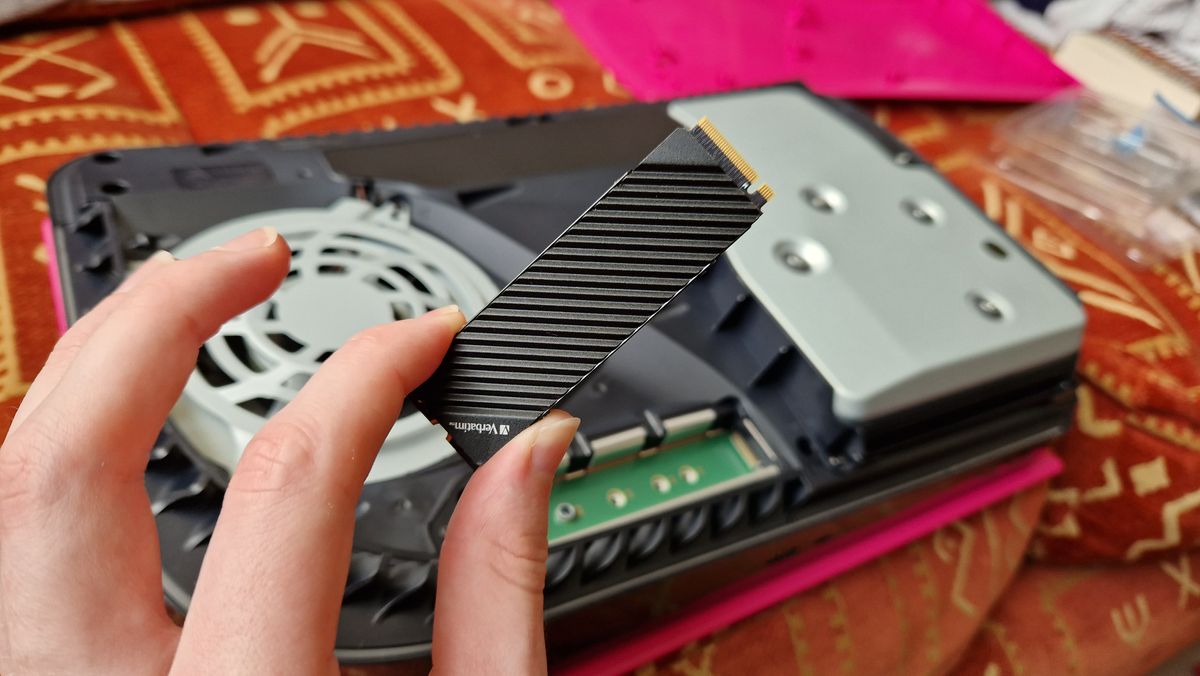12DOVE Verdict
The Verbatim Vi7000G isn't the be-all-end all-in-gen 4 SSD performance, but it might just be one of the best-value PS5 SSDs available. It beat the SN850P in our tests, it has a solid heatsink and a really competitive price for the 2TB model. Admittedly, it isn't the easiest to find, but if you can hunt it down, this is a dark horse in the PS5 SSD arena.
Pros
- +
Really decent read/write speeds for the money
- +
Great value for 2TB
- +
Solid heatsink
Cons
- -
PS5 benchmark doesn't get the speed on the box
- -
There are faster drives out there
- -
Random 4K performance could be better
- -
Not the easiest to find
Why you can trust 12DOVE
Besides being a little hard to find, the Verbatim Vi7000G might be one of the best SSDs you can get for your PS5. In a market that's dominated by more prominent brands that, at the moment, are all fairly guilty of some confusing price maneuvering, it's nice to see Verbatim enter the fray with something that keeps the pack honest.
Verbatim has been around in the storage market for ages, I remember my dad giving me a 1GB Verbatim USB memory stick to take to school with me which never let me down. But in the years since Sony released the PS5 and enabled its M.2 port, I haven't seen Verbatim release anything that could combat the best PS5 SSDs, or indeed the best SSDs for gaming.
Enter the Vi7000G, a PCIe Gen 4 NVMe SSD that's available in 1TB and 2TB capacities. It has an integrated heatsink, meaning it's predominantly designed for use with Sony's flagship console, but it does work just fine in a gaming PC. With honest UK prices of £81.50 (1TB) and £125 (2TB) and read speeds of up to 7,400MB/s, Verbatim is tackling the WD Blacks and Seagate Firecudas of the world. The drive is available in the US as well, but it's slightly more pricey at $147 and $195. Nevertheless, how does this new Verbatim drive get on against tried and tested rivals?
Design and Features
As mentioned, the Vi7000G is an M.2 SSD with a built-in heatsink. Like the WD Black SN850P and a fair few other SSDs from the past few years, it's not advised that you take these attached heatsinks off. The way these drives are designed makes it difficult, and it can actually impact performance and void warranties.
Luckily, the heatsink on board here isn't too bulky and actually works brilliantly. Although I can't speak to exact temperatures for this litmus test, whenever I do my standard PS5 transfer speed tests with drives like these, I take them out of the machine pretty quickly to try and bung in our testing PC for further benchmarking. Other SSDs are usually really warm to the touch despite their heatsinks, but Verbatim's stayed lukewarm, and never worried me.
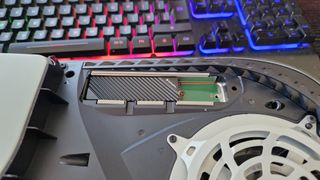
A small Verbatim logo sits in one corner, a bit like it does on the brand's best external hard drives, but other than that and a few simple ridges, the aesthetics are fairly underplayed here. I do like the fairly boxy and straight-cut design of this drive, particularly because it makes installation super easy. If an M.2 drive doesn't have a heatsink, or has one that's more curved at the bottom, it can make that final push into place quite finicky. Verbatim's Vi7000G is super easy to click into place after being laid flat, and overall I really like the textured, physical design of this drive.
While that heatsink is a bit tall, I had no problem in fitting it into our testing PC. If you plan to use this for one of the best gaming PCs, you shouldn't have too much trouble, you'll probably just need to ditch your motherboard's own heatsink panels.
In terms of size, the Vi7000G has an M.2 2280 form factor and works via a PCIe Gen 4 interface. Dimensions are 80mm x 23mm x 9.8mm, so it will fit inside the PS5's M.2 port and bolt down in the usual "80" screw hole, which is the same as the majority of top-performing drives for the console.
The Verbatim Vi7000G features a DRAM cache that will give write speeds a boost and quoted read speeds of up to 7,400MB/s. Write speeds on the box are up to 6,700MB/s. While the PS5 didn't quite recognize these speeds when installed, we'll talk more about them in just a second.
Performance
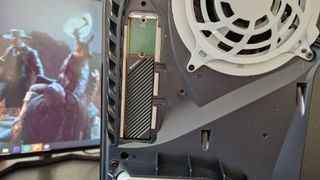
7,4000MB/s read speeds would place the Verbatim Vi7000G up there with the WD Black SN850X, the Seagate Firecuda 530, and the Samsung 990 Pro. In short, these are some of, if not the best-performing SSDs on this side of the Gen 5 barrier. In all likelihood, you'll probably spend the same amount of money on this Verbatim SSD as you would any of those in 1TB form - with the exception of Samsung, which tends to keep its prices a cut above the rest. While the listed prices for those top three are much higher, they're constantly on offer at the moment and frequently come down to this kind of price range at 1TB. 2TB is a different story, but more on that in a bit. What I like, however, is that this drive has entered the market at the equivalent "deal" prices - it isn't launching with a higher cost and then emulating the rest of the field with deal prices that are actually average prices.
The performance you get for the money here isn't quite as good, but if you aim for the 2TB model, you'll save some money and won't notice too much of a difference.
The PS5's installation benchmark recognized the 2TB drive I tested for this review at 6,250MB/s. So in the console, you're getting quicker load times than on the system's stock drive, but it isn't quite as fast as Verbatim's packaging would have you believe. It also comes in under those top three performing drives but is absolutely comparable with the WD Black SN850, and indeed the Samsung 980 Pro.
Inside a PC, however, CrystalDiskMark did actually get a lot closer to that advertised speed, recognizing an average of 7,124MB/s across three tests. Considering the SN850P we reviewed most recently will set you back more money in 2TB form and only achieved an average of 6,947MB/s in the same tests, I'd say Verbatim's got a bit of a dark horse in the SSD race here. Especially when you consider that one of the best PS5 external hard drives will set you back a similar amount or more for the same capacity.
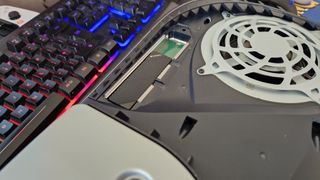
Write speeds were very capable too, with CrystalDiskMark showing me an average of 6,668MB/s across three tests. Again, it's not quite the ceiling of 6,700MB/s the box suggests, but it isn't bad by any means. In terms of IOPs (input/output operations per second), these read/write speeds equate to 6,794/6,366MB/s respectively. Rather impressively, this beats out the more expensive SN850P again, by a fairly comfortable margin. The one area the SN850P does have a clear advantage according to our CrystalDiskMark tests, is in random 4K speeds. The SN850P sat at an average of 91/405MB/s (read/write). The Verbatim Vi7000G only got around 81/331MB/s in this regard.
In terms of real-world performance, these numbers all add up to a very usable drive. In the PS5, 400GB of game data was transferred from the console's internal storage to the Vi7000G in only 6 minutes. A smaller 50GB load was transferred from the Vi7000G to the console in 4 minutes.
Load times in games were particularly impressive, with the Verbatim Vi7000G beating out the console's own drive and the SN850P we tested it against. HUNT: Showdown's offline Stillwater Bayou map loaded up in 42 seconds, GTA V Online was up and running in 47 seconds, and Outer Wilds, a game that loads much quicker, went from main menu to game in a flashy 5.73 seconds. With the SN850P, we found almost the same numbers, although GTA loaded a second slower, and Outer Wilds was 6 seconds flat.
While the Vi7000G doesn't exactly leave it in the dust, Verbatim does have a lower asking price for the same 2TB, so any kind of win here does feel much more significant.
Should you buy the Verbatim Vi7000G?
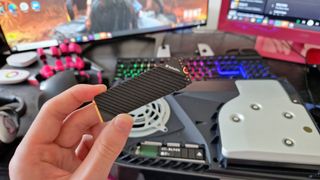
I think the Verbatim Vi7000G is a bit of a dark horse in the PS5 SSD race, especially for 2TB. It isn't quite in that upper echelon of Gen 4 performance, but it's knocking on the door without a doubt. Perhaps more importantly, it's priced very competitively. If this does go on sale and the 2TB model gets any cheaper, it's one of the best value drives to pull the trigger on.
While the SN850P we tested may have had a fault or two that meant it underperformed, I'd still argue the Verbatim Vi7000G is yet another reason not to buy it. If the SN850X, 990 Pro, or Seagate Firecuda 530 are on sale for cheaper than this, then I'd recommend those drives over it. This isn't the be-all and end-all - but it's certainly a great value option for sure. Random 4K performance could be better, but equating all of those benchmarked numbers to real-world in-game performance, you've got a great wee SSD for the money here.
The only other thing I'd note is that the Verbatim Vi7000G isn't the easiest to find in the US or UK. It's available at Amazon in the UK, and although the Verbatim page does list eBuyer and Scan as potential retailers, the drive is nowhere to be seen currently. In Europe, it seems to be more attainable, but the US is a similar story to the UK. Hopefully, this small caveat will be nullified since the Vi7000G is an easy contender in the PS5 SSD market. If you can find it, don't count it out.
How we tested the Verbatim Vi7000G
I put the Verbatim Vi7000G to work inside my PS5 for around a month before writing this review. I used it as my PS5's additional form of storage for all of that time and tried my hardest to fill up its pretty massive 2TB capacity.
I used the PS5's own installation benchmark to test its official read speed in the console. I then transferred game data back and forth and tracked the amount of time it took in every direction to get a sense of the read and write speeds in practical terms. I then loaded up GTA V Online, HUNT: Showdown, and Outer Wilds to get a feel for how the drive performed in gaming. I chose the first two of those games because they typically load slowly, so a strong-performing SSD should make those lengthy wait times a bit more bearable. Outer Wilds loads far quicker, but I feel like the split-second differences between SSDs trying to load games like that can be quite a fun way to test them out.
For PC benchmarking, I used CrystalDiskMark's tests, as well as Anvil Pro to get a more well-rounded feel for the Vi7000G's price-to-performance. These tests, as well as the PS5's gaming load times, were done three times each and then narrowed down to a mean average for the final review figures.
To read more about how we test the latest gaming tech here, check out our hardware policy.
If you get a hold of an SSD without a built-in heatsink, make sure to check out the best PS5 heatsinks if you want to use it in Sony's console. Want something more Xbox-shaped? Check out the best Xbox Series X hard drives, the best Xbox One external hard drives, and the best
One of my earliest memories is playing SuperMario64 and wondering why the controller I held had three grips, but I only had two hands. Ever since I've been in love with video games and their technology. After graduating from Edinburgh Napier University with a degree in Journalism, I contributed to the Scottish Games Network and completed an Editorial Internship at Expert Reviews. Over the last decade, I’ve been managing my own YouTube channel about my love of games too. These days, I'm one of the resident hardware nerds at 12DOVE, and I take the lead on our coverage of gaming PCs, VR, controllers, gaming chairs, and content creation gear. Now, I better stop myself here before I get talking about my favourite games like HUNT: Showdown, Dishonored, and Towerfall Ascension. Location: UK Remote
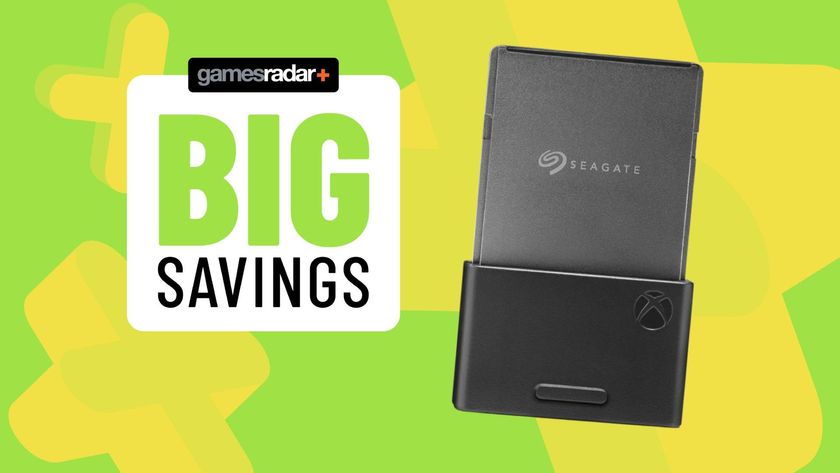
The 2TB Seagate Expansion Card has returned to a price I haven't seen since last year's Black Friday

Sneaky restock notes suggest Pokemon Prismatic Evolutions is likely to return to stores in May

The Witcher 4 has "a huge team" focused on the believability of the RPG's world, because even things like trees and foliage always need to belong
